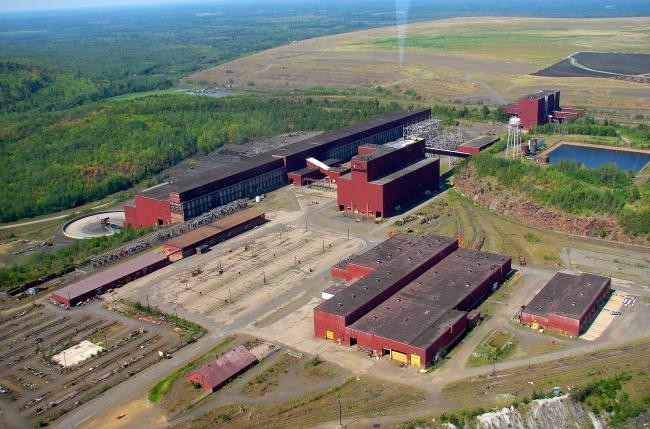Support the Timberjay by making a donation.
Lawsuit: PolyMet got a ‘sweetheart deal’ on USFS land exchange
REGIONAL— St. Paul-based Water Legacy has filed a lawsuit that seeks to set aside the U.S. Forest Service’s recent approval of a land exchange with PolyMet Mining. The lawsuit, filed Monday, in …
This item is available in full to subscribers.
Attention subscribers
To continue reading, you will need to either log in to your subscriber account, or purchase a new subscription.
If you are a current print subscriber, you can set up a free website account and connect your subscription to it by clicking here.
If you are a digital subscriber with an active, online-only subscription then you already have an account here. Just reset your password if you've not yet logged in to your account on this new site.
Otherwise, click here to view your options for subscribing.
Please log in to continue |
Lawsuit: PolyMet got a ‘sweetheart deal’ on USFS land exchange
REGIONAL— St. Paul-based Water Legacy has filed a lawsuit that seeks to set aside the U.S. Forest Service’s recent approval of a land exchange with PolyMet Mining. The lawsuit, filed Monday, in U.S. District Court in Minneapolis, argues that the Forest Service disregarded federal law and regulations by setting the land valuations for the exchange too low, effectively forcing U.S. taxpayers to subsidize a foreign corporation.
The lawsuit is the second filed against the Forest Service since the agency approved the land exchange on Jan. 9. On Jan. 10, the Center for Biological Diversity and Earthworks filed notice of intent to sue under the authority of the Endangered Species Act.
Water Legacy’s suit, by contrast, is focused primarily on taxpayer concerns. “The federal government is not supposed to be giving corporations a sweetheart deal,” said Water Legacy attorney Paula Maccabee. “They’re supposed to make sure that a foreign company is not getting a windfall at the public’s expense.”
Maccabee takes issue with the Forest Service’s decision to appraise the 6,650-acres of federal land that PolyMet is seeking to exchange as if the company intended to use the land for forestry, rather than mining.
“The Forest Service turned a blind eye to the purpose of the land exchange, the exploitable minerals on the lands, and Minnesota’s private market where mining companies pay a premium to buy lands for existing and potential mining uses,” said WaterLegacy attorney Paula Maccabee.
Maccabee cites federal law, including the Federal Land Policy and Management Act, which require that federal lands, under consideration for exchange, must be valued for their “highest and best use.” The Forest Service set the value of the federal lands at $550 per acre, based on income calculations for timber production and comparable sales in Wisconsin and Michigan of very large tracts of timberlands. Instead, Maccabee argues that the Forest Service should have looked at comparable sales in northeastern Minnesota for lands obtained for mining purposes. She noted that the federal appraisal information included sales data on nine private sales in Minnesota, where mining companies sought to obtain lands for mineral development, and showed an average price per acre of $1,645. But that data was not included in determining the land value of the PolyMet exchange, according to Maccabee.
The Timberjay sought to obtain appraisal information nearly two years ago under the Freedom of Information Act, but the Forest Service never provided the information.
Maccabee cites a similar struggle to obtain details behind the appraisal, noting that she first requested appraisal information in 2013. She said the Forest Service did not comply until last October, but that was well past the deadline for challenging the appraisal used in the exchange proposal.
PolyMet spokesperson Bruce Richardson said the company has confidence in the validity of the federal appraisal process. “After years of review and analysis, the Forest Service has determined the land exchange is in the best public interest,” Richardson added.
Impact of lawsuit
The immediate effect of the lawsuit is unclear. The court filing submitted by Water Legacy on Monday does not seek a court injunction against any of the needed title transfers and other legal steps required to actually implement the land exchange. Maccabee said her organization is currently considering whether to file a separate motion for such an injunction.
If the suit is ultimately successful, the impact on the project could be significant, particularly if the courts agreed that the Forest Service was giving away federal lands too cheaply. Maccabee said that would presumably require PolyMet to purchase significantly more land, potentially thousands of acres, to achieve a relatively equal exchange.
The Forest Service would then potentially have to go through a new appraisal process before issuing a new decision.
Exchange needed
The Forest Service agreed to undertake the exchange in part to resolve a conflict between PolyMet’s plans for an open pit mine and federal law that prohibits surface mining on Forest Service land— such as the 6,650-acres in question— acquired under the Weeks Act. In its record of decision, the Forest Service acknowledges that it was proposing the exchange in order to forestall possible litigation by PolyMet over the Forest Service’s interpretation of the Weeks Act. The agency declined to comment on the Water Legacy lawsuit.
PolyMet supporters note that the mine, if approved, is expected to create about 300 mining jobs for 20 years.






